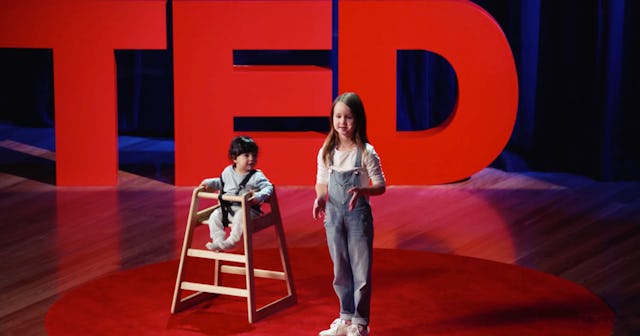This Amazing 7-Year-Old Gives A TED Talk Telling Us How To Play With Our Kids

When my kids were little, I played with them. I let the “helicopter” swoop down and feed them a spoonful of the homemade baby food I made them. There’s a video of the three of us, my twin daughters and I, giggling as the blanket covers their smiling faces only to surprise them when the blanket is pulled off of their heads. I bought all of the gadgets, the alphabet mat, the blocks with three-letter words on them, the foam bathtub letters hoping they would learn how to spell their names before they turned two. I had high expectations for them and for me.
In an enlightening Ted Talk, speaker Molly Wright teaches parents five ways we can help our kids not only survive but thrive — and she says you don’t need to buy anything to help their development.
The astonishing thing? Molly Wright is seven years old.
Molly Wright: How every child can thrive by five
In the seven-minute video, Molly explains that helping our kids thrive begins during pregnancy, even before our kid is born. We know the importance of eating healthy, exercising, and maintaining — as best we can — a healthy mental and emotional state while we are pregnant. But what about the babies, how can we help them thrive while pregnant? Molly’s first two tips to help your baby thrive are connecting and talking with your baby. You can do both of these while they are growing in your belly. At night, when your indigestion keeps you up, say kind words to your growing baby. The act of rubbing your belly is a way of connecting with your baby. Playing music, singing, taking a walk, and explaining what you see to the baby, all help with their development before you give birth.
In Molly Wright’s Ted Talk, she reminds us that we must “serve and return” with our kids, which includes connecting and talking to them. Molly also points out that playing with your child aids in their development in ways that will help them later in life. “Interactions, early and often, matter,” she states. “Take it from me, the seven-year-old up here talking about brain science.”
TED
Molly Wright doesn’t explicitly say it, but she uses the example of a father and son, one-year-old Ari and his dad Amarjot, to show us in real-time what happens when parents are more concerned with their devices than their children. You can see the stress that Ari is under when his father decides to focus on his iPad rather than on his son, who is also right there in front of him. “Kids are hardwired to seek out meaningful connections,” Molly says as baby Ari fusses for his dad’s attention. “Not receiving it causes confusion and stress.”
There is no denying that we, as parents, often spend too much time on our devices, even while at dinner. After listening to the advice from Molly Wright, I will no longer get irritated with my wife when she’s out with the kids and doesn’t return my text or phone call. I know she is being attentive to our kids and their needs. My wife is so good about being with our kids and in the moment with them, and I am learning from her.
Molly’s final tip is about providing a community for your child. The people we surround our kids with matter. From family to friends to neighbors, our children are influenced by everyone who comes into their life. It’s our job as their parents to protect them and provide a healthy community of people they can learn from and be supported by.
TED
Not only does a community provide support for parents, but it provides an exposure to diversity and a sense of belonging for kids. “Community involvement sends a powerful message to children. It’s one that says you are important. You are loved. You belong. And it’s a message that, with it, holds the strength to empower every child in the world,” says Children’s Bureau. You’ve heard the adage that it takes a village to raise a child, and the people we choose to make up that village will have a lifelong impact on our kids’ development — so choose wisely. Exchange Family Center has some valuable tips on strengthening your “village” … or outright creating one if you’re lacking.
“Every moment together is an opportunity to connect, talk, and play,” Molly reminds us at the conclusion of her talk. “To us, to children, it’s so much more than just a game. It’s our future.”
This article was originally published on